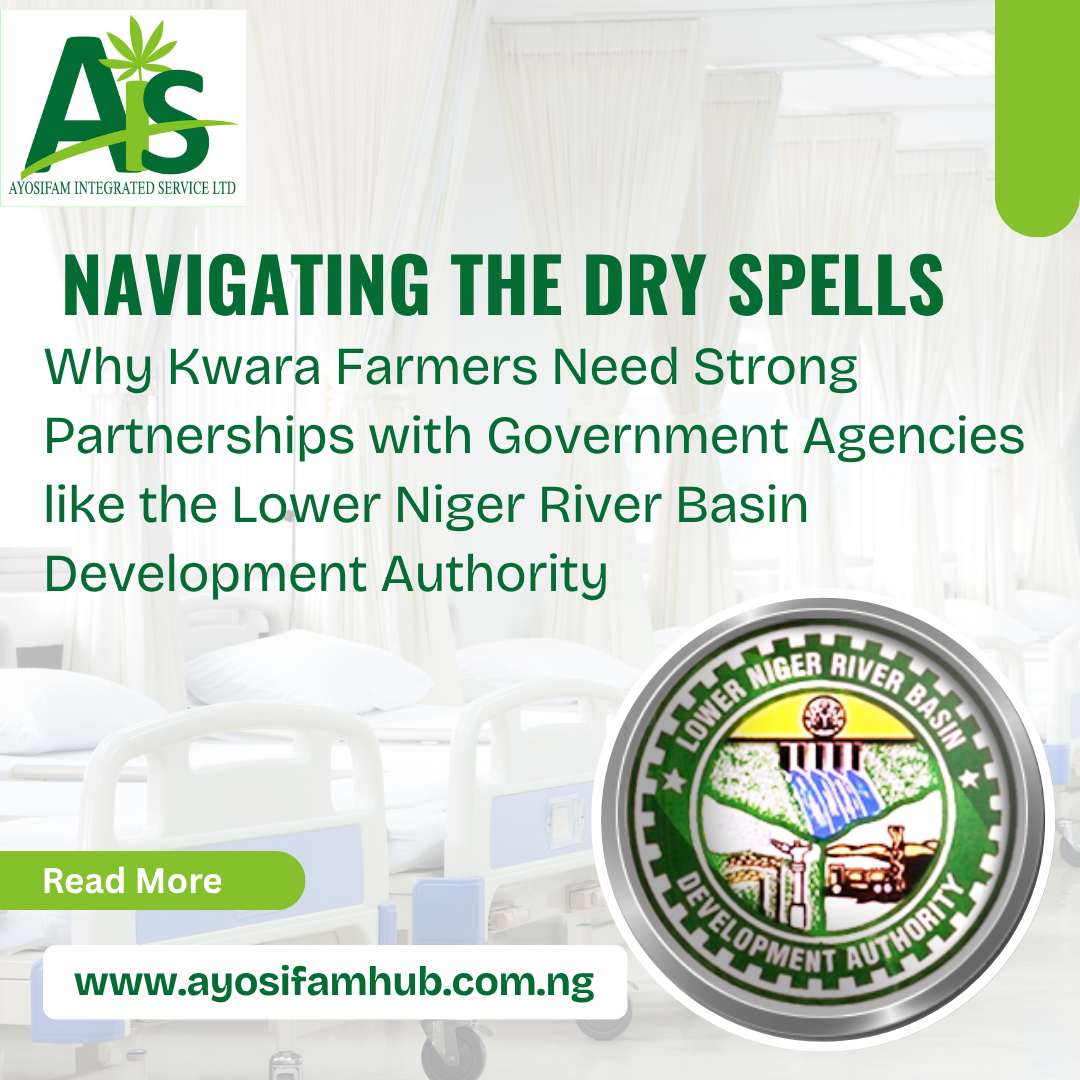By AyosifamHub Team
The recent dry spells in Ilorin, Kwara State, are a stark reminder of the challenges our farmers face. Four days of no rainfall, followed by another four-day break, and a forecast from NIMET indicating this dry stretch will continue until at least Wednesday, July 2nd, highlight the urgent need for robust strategies to support agricultural productivity. In times like these, the critical role of government agencies, particularly the Lower Niger River Basin Development Authority (LNRBDA), becomes undeniably clear. For farmers to thrive and ensure food security, forging strong partnerships with these entities is not just beneficial, but essential.
Dams: A Lifeline in Erratic Climates
One of the most significant advantages of government intervention in agriculture is the construction and maintenance of vital infrastructure like dams. In Kwara State, the Asa Dam stands out as a prime example. Constructed by the government, this dam on the River Asa, located near Ilorin, serves multiple purposes beyond just providing potable water. It is a crucial source of irrigation water for farming, fisheries, and livestock development. The Omu-Aran Irrigation Project, completed in 2022 by the LNRBDA, is another testament to the government’s commitment to enabling all-year-round farming activities, boosting food production and income for local communities. Other interventions like the construction of Okuta Dam and upgrading of Malete Dam further underscore this dedication.
These dams are not mere structures; they are lifelines, offering a buffer against the increasingly erratic rainfall patterns caused by climate change. With a reliable water source, farmers can engage in multiple planting seasons, diversify their crops, and significantly increase yields, thereby improving their livelihoods and contributing to national food security.
Beyond Water: The Multifaceted Benefits of Partnership with LNRBDA
The Lower Niger River Basin Development Authority (LNRBDA) is not just about dam construction and irrigation. Its mandate extends to a comprehensive development of both surface and underground water resources for multipurpose use, with a particular emphasis on irrigated agriculture. Here’s why identifying and fostering partnerships with them is a game-changer for Kwara farmers:
a, Access to Irrigation Infrastructure and Modern Techniques: The LNRBDA actively develops and maintains irrigation schemes. By partnering with them, farmers can gain access to these crucial systems. Furthermore, the Authority is tasked with introducing modern and efficient irrigation techniques, such as drip and sprinkler irrigation, which optimize water usage and minimize waste. Through their training and extension services, farmers can learn about and adopt these advanced methods, leading to higher crop yields and increased income.
b, Mechanization Support: Tractors and Smaller Machines: A significant bottleneck for many farmers is access to appropriate machinery for land preparation and cultivation. The LNRBDA also plays a crucial role in providing support to farmers with tractors and smaller cultivation machines. This directly addresses the challenges of manual labour, increases efficiency, reduces drudgery, and allows for timely farming operations, which are critical, especially during short planting windows or in preparing fields for dry season farming.
c, Input Support and Empowerment Programs: The LNRBDA has a history of empowering farmers with inputs. They have provided support to rice farmers with essential agricultural inputs and have also trained and empowered youths in Kwara and Kogi states on agricultural practices. Such initiatives can significantly reduce the financial burden on farmers and equip them with the knowledge to succeed.
d, Flood and Erosion Control: Beyond irrigation, the LNRBDA is also involved in constructing and maintaining flood and erosion control structures. This is vital for protecting farmlands from environmental degradation, especially during periods of heavy rainfall (when they eventually come).
e, Technical Expertise and Data: The LNRBDA is mandated to develop and keep up-to-date a comprehensive water resources master plan, identifying all water resource requirements in its area of operation through adequate collection and collation of water resources, water use, socio-economic, and environmental data. This means they possess invaluable technical expertise and data that can guide farmers on best practices, crop selection, and water management strategies tailored to local conditions.
f, Facilitating Public-Private Partnerships: The LNRBDA is increasingly open to public-private partnership arrangements for harvesting and processing agricultural produce, especially dry season paddy. This creates opportunities for farmers to connect with off-takers and enhance the value chain of their products.
g, Access to Research and Extension Services: River Basin Development Authorities often collaborate with research institutes. This can translate to farmers gaining access to cutting-edge research, improved seed varieties, and agricultural best practices that can significantly boost their productivity.
The Way Forward: Proactive Engagement
For farmers in Ilorin and across Kwara State, the current dry spell is a powerful call to action. Instead of solely relying on unpredictable rainfall, it’s time to proactively engage with government agents like the Lower Niger River Basin Development Authority. Attend their programs, inquire about available schemes, and actively participate in water user associations.
The government, through agencies like the LNRBDA, is committed to transforming Nigeria’s agribusiness sector. By fostering strong, respectful partnerships, Kwara farmers can unlock the full potential of their land, build resilience against climate variability, and secure a more prosperous future for themselves and for the nation’s food security. Let us embrace these partnerships as the key to navigating the challenges and seizing the opportunities that lie ahead in our agricultural journey.




